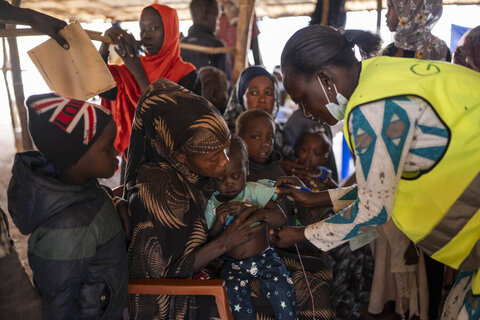What’s Inside the Purple Box?

In Sudan, 1.8 million children under the age of 5 are acutely malnourished, a longer-term consequence of micronutrient deficiencies.
Last year, WFP collaborated with a local company to create its very own branding of micronutrient powder — Vitamino, containing 15 essential vitamins and minerals. The products' target market ranges between 6 months to 5 years of age, aiming to provide children with nutritional supplements that are required for healthy physical and mental development.
In July 2018, Vitamino and its trademark purple box hit retail outlets across urban areas in selected pharmacies and supermarkets, to help reach more of the population. The micronutrient powder has been available since, at affordable prices from pharmacies across Sudan.
Marketing campaign
Last year, WFP launched a marketing campaign across Sudan's capital, Khartoum, targeting parents and caretakers of children to address micronutrient deficiencies. The campaign — Hidden Hunger — introduces Vitamino to the Sudanese market while at the same time raising awareness about the importance of preventative nutrition.
As the current chair of the United Nations Network (UNN) under the Scaling Up Nutrition movement, WFP is working closely with the Sudan SUN Business Network to ensure that the private sector is playing an increasingly important role in addressing nutrition in a sustainable manner. The Vitamino retail platform is an example of this collaboration.
The Vitamino twins

Muneer and Mohamed, now healthy toddler twins, weighed less than half the weight of a healthy newborn. At 1.5 kg each, their mother couldn't imagine they would grow into their healthy selves.
Their mother was worried for their health until a friend and staff member at WFP introduced her to Vitamino — as a cost-effective and easy way to enrich the boys' diets.
"Vitamino has become an essential part of the food we give to the twins on a regular basis since six months of age," says their mother. "It helps them grow like all other children and they like it very much. The good news is that we can find it at most pharmacies around the city and at cheap and affordable prices too."
Changing perceptions
More than 80 percent of preschoolers across Sudan are affected by micronutrient deficiencies, which means they are not adequately receiving enough vitamins and minerals through their diets. As part of WFP's nutrition activities in the country, Vitamino is being distributed at no cost to the most vulnerable including internally displaced families and refugees in communities across nine states in Sudan.
Additionally, the organization is taking a leap to broaden its reach to target low-middle income segments of the population — that are acutely unaware of the lasting impacts of micronutrient deficiencies or ‘hidden hunger'. This bold initiative helps more people understand the value of food diversity and why they should pay attention to the food they are consuming. This is primarily due to the misconception that living in urban areas with a steady job shields people from poor nutrition practices.

"Our first campaign was a teaser, where we wanted to attract interest in the concept one month prior to the product's release, and then we launched the purple box, presenting Vitamino as the solution to hidden hunger,"explains WFP Vitamino Retail Specialist Hassan Giha. "Vitamino is not only a way to treat the problem but also to prevent it by providing a product that is affordable, readily available and simple to use — just sprinkle on the powder to already made food once per day."
During the teaser campaign, 100 billboards were displayed across the state with the title ‘Hidden Hunger has a Solution', which attracted a lot of discussion on social media. The company even launched its own hotline to assist people with questions — receiving over 800 calls within the first two months of the campaign.
Social and behavior change communication campaigns provide a relatively inexpensive way to address nutritional issues in Sudan, as shifting perceptions and education has a lasting social impact. Similarly, the approach allows WFP to streamline a more integrated life-cycle approach, incorporating education and food fortification to help support Sudan develop its most significant asset– its human capital.
Collaboration Across Agencies
WFP maintains the rights to the brand and works alongside a local company to manage the supply chain of the product — helping to import and distribute the product to pharmacies across selected states in the country. WFP's contribution to the branding, marketing and nutrition awareness campaign ensures that the cost of Vitamino remains affordable.
The Federal Ministry of Health has also been a driving force, working towards listing Vitamino on Sudan's essential list of drugs — which aims to enable the supply of the product and working to put in place legislation to facilitate the retail platform. In a country where the supply of goods can be limited, this type of support goes a very long way to reaching people in need.

Engaging the Private Sector
It almost seems impossible until it is done. In a country with limited international private sector engagement due to decades of economic sanctions, WFP's vision to manufacture its very own micronutrient powder is now a hard-earned reality.
Sustainable nutrition interventions need the involvement of the private sector. Globally, the private sector is playing an increasingly important role in addressing malnutrition through innovation, increased efficiency and empowering people across all socio-economic levels by having the freedom to choose nutritional products at an affordable price. With this in mind, WFP has taken into consideration opportunities where engaging the private sector can help in achieving our long-term goals.

